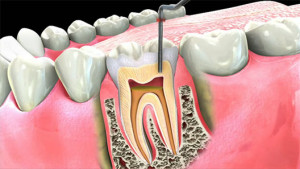Endodontic therapy also called as root canal therapy, is treated for the infected pulp of a tooth resulting in the protection of the decontaminated tooth from the future microbial invasion and complete elimination of infection.
Inside the tooth, the soft tissue called the pulp is present under the white enamel and dentin (a hard layer). The pulp consists of connective tissue, blood vessels, and nerves that help to grow the root of the teeth during development. A completely developed tooth without a pulp can survive by getting nourishment by from the surrounding tissues.
Root canal treatment that saves the natural tooth has many advantages, such as:
- Natural appearance,
- Efficient chewing,
- Normal biting force and sensation,
- Protects other tooth from excessive wear or strain etc.
Root canal or endodontic treatment, an interior tooth treatment that is necessary when the pulp becomes inflamed or infected. The inflammation or infection may be due to different causes: faulty crowns, deep decay, repeated dental procedures on the tooth, or a chip or crack in the tooth. Additionally, trauma may lead to pulp damage even with the invisibility of chips or cracks on the tooth. Untreated pulp inflammation or infection may lead to an abscess. Gum disease may also give rise to root canal problems necessitating root canal treatment.
During root canal or endodontic treatment, the inflamed or infected pulp is removed and the tooth is carefully cleaned and disinfected inside, which is then filled and sealed with a rubber-like material called gutta-percha. Later, the tooth is restored with a crown or filling for protection which continues to function like any other tooth. A proper root canal treatment effectively removes the infected part of the pulp from the tooth.
Endodontic treatment helps to maintain a natural smile, continue eating the food that one is fond of and limits the visit to doctor.

